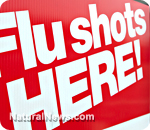Dr. Danuta Skowronski from the Canadian equivalent of the U.S. Centers for Disease Control and Prevention (CDC) recently observed as part of a comprehensive analysis that individuals who received an annual flu shot during the 2008-09 winter season had a disproportionately higher risk of developing H1N1 infection than individuals who were not vaccinated. Confirming earlier suspicions, Dr. Skowronski and her colleagues observed after recreating the phenomenon in a group of ferrets that the annual flu shot from that year was definitively linked to higher rates of H1N1 infection.
Presented at the Interscience Conference on Antimicrobial Agents and Chemotherapy in San Francisco, the study included evaluating 32 ferrets, half of who received the 2008-09 seasonal flu shot, and the other half of who received a placebo shot. The researchers did not know which ferrets received which vaccine until the end of the study.
Upon conclusion, all the ferrets ended up developing H1N1, but the ferrets from the vaccinated group were the first to get it. The vaccinated group also became much sicker than the unvaccinated group, and appears to have very likely infected the unvaccinated group. These findings match up with those of five other Canadian studies conducted in other provinces outside British Columbia where elevated rates of H1N1 infection were also observed among individuals who had received their annual flu shot.
"The findings are consistent with the increased risk that we saw in the human studies," said Dr. Skowronski to the Vancouver Sun.
What this all goes to show, of course, is that not only was the seasonal flu shot a failure at preventing H1N1, but it was also apparently a cause of H1N1 infection. If the seasonal flu shot had been properly tested, which it most definitely was not, it would have become apparent that the shot was not only ineffective at preventing H1N1, but also a definitive cause of H1N1 infection.


No comments:
Post a Comment